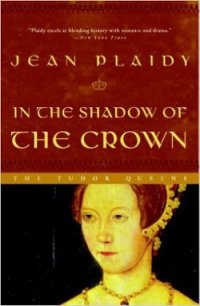Royal Road to Fotheringhay - Plaidy Jean (читать книги полностью без сокращений .txt) 📗
“No!” he cried. “Then I shall have to make you.”
With that he picked her up as though she herself were no heavier than the smallest flagon of wine. He put her on the couch. Then Bessie began to understand.
THE QUEEN was humiliated beyond endurance.
She and her husband had been entertained at the house of one of the rich burghers of the city. Darnley no longer attempted to hide from her the fact that he was a heavy drinker and, worse still, a drinker who could not carry his drink.
He no longer bothered to disguise his true nature. She had to agree with others that he was vain, dissolute and despicable. He would pick quarrels with those who dared not stand up to him; he brawled in the streets, accosting women, demanding that his companions did likewise; he boasted of his mastery over the Queen who, he asserted, was so madly in love with him that she would deny him nothing.
Mary watched him, and as she did so her feelings toward him were first lacerated with humiliation and then began to grow colder.
She had begged him this evening to drink less. He had shouted at her before the company that it was no matter for her to decide what he should drink. She should remember that he was her lawful husband. He knew how to punish her, he said with a leer, if she did not treat him with due respect.
This was more than Mary could endure.
She bade good-bye to her host, and, in tears of humiliation and rage, left the house.
Darnley stayed on to drink himself unconscious and be carried back to Holyroodhouse by his attendants and friends.
She was in her apartment when one of them came to tell her that he had been brought back to the palace and put to bed.
She nodded coldly.
There were no more tears; she was no longer heartbroken, for she had made a strange discovery: she had ceased to care for Darnley.
She did not understand herself. That raging passion which had swept over her had turned completely cold. It had died as suddenly as it had flared. She could not understand how she could have imagined herself in love with the dissolute youth. She began to see him in a new light. The blue eyes which she had thought so beautiful now seemed inane, the soft lips weak and foolish. She had begun to suspect that what she had so desperately needed was not Darnley’s love but a lover. She was beginning to know herself.
A great sadness came to her. She had dreamed of the perfect union, and she was discovering most bitter disillusion. Darnley’s boyish naivete was assumed; he was hideously experienced; he was full of vice; he had practiced every sort of depravity. How he must have laughed at her for falling such an easy victim to his youthful charm.
There was one other factor—a most important one—which had caused her to decide on the measures she would take: she was pregnant.
Perhaps her pregnancy made her less eager for his embraces; perhaps the slackening of desire had given her a chance to see him as he really was. No matter. She saw; and she had made up her mind.
She rose and sent a page to David Rizzio with a message that she wished to see him at once. It was midnight, but he had not retired. Early hours were never kept at Holyroodhouse.
“David,” she said, “I have something secret to tell you. I wish no one else to know it. I hate Darnley.”
“Madam!”
“Yes, it is true. It has suddenly come to me. I did not really love him. There had been so much talk of marriages, and they never materialized. I suppose I wanted a lover and he was there. He seemed more eligible than anyone within reach. Now I think him loathly. Oh, David, you wonder. I have been so doting, have I not? You wonder if I really mean what I say.”
“Madam, his behavior tonight was disgraceful.”
“His behavior every night is disgraceful. He was quite insincere before the wedding. Now we see him as he really is—an arrogant upstart, a drunkard and a lecher. Let us face the truth, David. How has he behaved toward you? Do not speak. I will tell you. He has been insufferable, although when he first came here, knowing the influence you had with me, he made himself most agreeable. That is the truth, is it not, David?”
“Yes, Madam.”
“And you agree with me that my marriage is the biggest mistake I ever made?”
“It was mine too, Madam. I do not forget that I urged you to this marriage.”
“Dear Davie! You did, it is true. But you could not have urged me to the altar if I had not wished to go. The mistake is mine, not yours. We have both been deceived, but let us not ponder on past errors. I have determined to banish him, right out of my heart and from my bed. He shall never share the crown.”
“No, Madam, he should not.”
“It is great good fortune that I have not already bestowed on him the Crown Matrimonial which would have given him powers equal to my own. Then we should have been too late. In future no documents are to be shown to him. We will have a stamp made with his name on it so that his signature will not be necessary on any documents, and you can affix it without consulting him. Consult him! What would be the good of his opinion!”
“Madam, he will be infuriated when he hears of this.”
“Davie, his fury matters not at all. I will show him that any power he wields comes from me. I shall never give him another chance to humiliate me as he has tonight.”
David was smiling; he was well pleased. His dignity was dear to him, and Darnley had insulted him time after time. David had known that the Queen must one day grow out of her infatuation, and he was glad that time had come.
“Madam,” he said at length, “you do well to cut Lord Darnley out of your policies. He has no conception of the important part you have to play in world politics. His own egoism, his own vanity are so large that they obscure his vision and he cannot see beyond them. Madam, never has your position been so secure. These dispatches from the King of Spain make his attitude clear. He is delighted with the turn of events in Scotland, and this happy state of affairs, he knows, has grown out of Your Majesty’s prompt action against the rebel lords. With Moray and his friends in England, and with Knox subdued, you have so pleased King Philip that he is planning to help you establish yourself even more firmly on the throne of Scotland, with the Catholic religion restored. Madam, I know that the King of Spain sees no reason why an attack—providing our affairs continue to improve—should not be made on our enemy beyond the Border. The King of Spain visualizes the day when the Protestant bastard is robbed of the crown she has no right to wear, and it adorns your own fair brow.”
“Queen of England and Scotland, David!” Her eyes shone. “That is what I want. If we were one country, then would these wasteful Border raids be discontinued. We are one land; we should stand together. That way lies peace, Davie.”
“Yes, Madam. It will be the happiest day of my life when I see you crowned Queen of England.”
“And Philip will truly further this end?”
“He has said so quite clearly … or as clearly as can be expected from one so cautious. I beg of Your Majesty to read this dispatch.”
They were bending over the table reading, when the door was burst open. Darnley stood watching them; his nightshirt was open at the neck, his hair disordered, his face blotchy, his eyes bloodshot from his recent carousal. He was still very drunk.
“I knew it!” he shouted. “So you are there then… you two together. I knew I’d catch you. I know it’s true what they say of you… furtively creeping away together…. The Queen of Scotland and a low-born music-maker. By God!”
The Queen said haughtily: “Go back to your apartment at once.”
Darnley laughed. “Do not think to deceive me, Madam.”
“I have no intention of deceiving you. I will tell you plainly that I am weary of your disgraceful behavior. Henceforth you and I live apart.”




